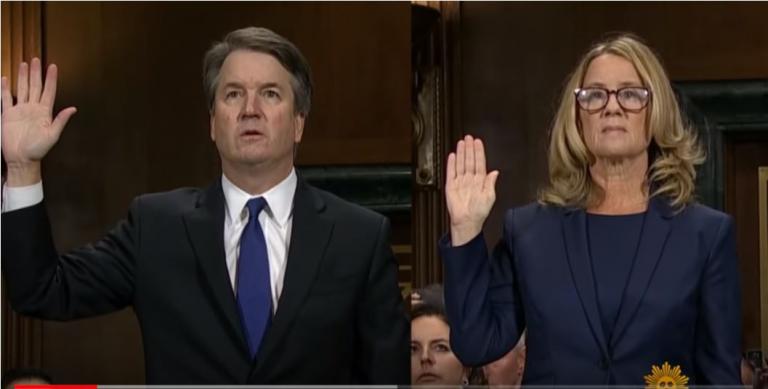I did not want to write about Judge Kavanaugh.
There are many reasons, but two stand out among the others. The first is that I recognize how significant his nomination is and his potential appointment to the Supreme Court would be, and I neither want to understate that significance nor overstate it and scapegoat him. By “scapegoat,” I’m not referring to guilt or innocence (although in the case of specific allegations made against him, that very much matters) but to the potential for his unique personhood to be subsumed under the symbolism of systemic injustices in which he may participate but which go far beyond him. To scapegoat is to single out a person or group and put on their shoulders the weight of cultural crises and failings that we all have a responsibility to change. In the case of Judge Kavanaugh, it is true that his judgment has already affected countless lives, given his work in consequential positions including White House counsel and the D. C. District Court of Appeals. It is also true that his potential appointment to the Supreme Court could have global consequences and, given the unique circumstances of this nominee, would harmfully affect millions of people, particularly women, in the message it would send should his allegations of sexual crimes not be definitively disproven beforehand. Given the enormous gravity of the situation, it is hard to balance the weight of his significance as a Supreme Court nominee and all of its implications with the knowledge that he is still one man and that for all he may be able to do, the question of true justice goes far beyond him.
This leads to the second reason I didn’t want to write about Kavanaugh: the inadequacy I feel addressing intimate matters of justice. The question I keep returning to when I consider the allegations swirling around him is this: “What does restorative justice look like for crimes of rape and sexual assault?” And I didn’t want to write about Kavanaugh because I really have no idea how to answer that question. I have not experienced the trauma of sexual assault and cannot begin to fathom its horror. I know that many who have experienced it have been reliving their horrors over the course of this nomination process. And beyond whatever Kavanaugh’s ultimate fate may be, whether he finds himself on the Court or in court one day, I want healing. I want healing for victims from their trauma, healing for perpetrators from their dehumanizing dehumanization of others, and healing for our culture from the systems that undermine dignity and perpetuate violence. Our current justice system should help facilitate that healing, and it is often counterproductive to that task. I struggle wondering where to begin to fix it, inadequate to the task of even articulating the questions.
So I didn’t want to write about Kavanaugh. But after watching the courageous testimony of Dr. Christine Blasey Ford, I realize I can’t focus my energy elsewhere. The deeper questions of justice – for women, for humanity – keep swirling through my head. My thoughts encompass but go far beyond Judge Kavanaugh’s nomination, and I can’t move on until I write about them. The lens of this case can be a window into far larger issues.
True justice goes far beyond the appointment of anyone to the Supreme Court. But creating a better system of justice requires singular actions, and appointing a Supreme Court justice is one of those actions. It would not serve the purpose of justice to promote Judge Brett Kavanaugh to the highest court in the United States.
I say this not because I have ill will toward Judge Kavanaugh, but because I have compassion for all who have been or may be harmed by his lack of judgment. Judge Kavanaugh’s accusers bring human faces to a sense of callousness, mercilessness, and willingness to sacrifice others that has manifested in matters of Kavanaugh’s judgment beyond his alleged personal indiscretions.
“Indelible in the hippocampus is the laughter, the laugh — the uproarious laughter between the two [Kavanaugh and Mark Judge], and their having fun at my expense,” Dr. Ford testified. Her testimony expresses the painfully personal incarnation of a dehumanization and an indifference to suffering that is broadly exercised not only in our justice system, but in our cultural justifications for injustice. At the heart of the matter is abuse of power, from the bedroom to the halls of government. Of course, this problem goes far beyond Kavanaugh. But even if allegations prove mistaken, Kavanaugh has made decisions in the course of his career that have disregarded the humanity of those under his power. Author Peter Dimock connects a political system that would undermine and discredit, without formal investigation, the allegations of Judge Kavanaugh’s sexual crimes with the legal justifications for torture to which Judge Kavanaugh contributed during his tenure in the George W. Bush White House. “Both perpetrate a formally sanctioned illicit unchecked violence exercised without accountability against devalued, defenseless persons.”
From intimate relations to international relations, our culture needs a reformation, and our justice system, and our perception of justice itself, must be at the heart of that reformation. To appoint to the highest court in our land someone with credible, if not definitively proven, sexual assault allegations against him, someone directly involved in the authorization of torture, sends the message that our nation’s justice system is based on the preservation of the powerful at the expense of the vulnerable. To the extent that this is true, it needs to change.
Transforming our justice system from retributive to restorative cannot include promoting Judge Kavanaugh, but it must include having compassion for him, even if allegations are proven true. A system of restorative justice, and a culture that defines justice as right relationship from the personal to the professional, from the intimate to the international, must be founded on principles of compassion and respect for the inexorable dignity of every human being. It would extend beyond the courtroom to domestic and foreign policies as well as institutional and personal relationships. It would be a system of consequences but not condemnation. It would be a system that would prioritize prevention over punishment by creating the conditions for people to be and do their best. And when people harm others, a system of restorative justice would both expect and enable people to do better.
As I have said, I do not know what a system of restorative justice would look like for such intimate crimes as rape and sexual assault. I can’t even begin to fathom. In cases of nonviolent crimes, I would advocate the victim and perpetrator meeting face-to-face, but in cases of intimate violence, such encounters could compound the trauma of the victim. So I don’t know where to begin, except by listening. To create systems of restorative justice, we must listen to those who have experienced injustice.
This I know for sure: a justice system founded on compassion can only exist in a world where vulnerable people are able to speak and be heard and respected. To transform our justice system, we must acknowledge and work to transform the systemic inequities that plague our culture, like racism and patriarchy. So while forgiveness and compassion for those who perpetrate crimes like rape and sexual assault would be critical components for a system of restorative justice, the foundation of that system would be the space for women to tell their stories without fear or shame. Those who would advocate forgiveness for perpetrators without working to build that foundation are building their homes on sand.
And the good news is that the foundations of equality and respect are finally being laid as women are finding the courage to come forward and tell their stories. Women are making a difference. Dr. Ford’s testimony was built on the shoulders of the #MeToo movement, as was the courage of two women – Ana Maria Archila and Maria Gallagher – who stopped Senator Jeff Flake at an elevator, told him their stories, and were ultimately instrumental in pushing for the FBI investigation that the Senate Judiciary Committee finally requested and President Trump finally authorized. We are closer to the truth than we were before, and moreover, we are building a nation in which those who are vulnerable can speak and be heard. This is how ordinary people, coming together, can wield extraordinary power for the good.
But in order for people to come together, we must understand one another. While many oppose Judge Kavanaugh’s confirmation for fear the allegations against him are true, others have different fears. Some are afraid of potential false accusations. These happen, and although they very rarely stand up in court, they may devastate careers. Some see Judge Kavanaugh as an example of how unproven allegations can ruin a career. Should he not be appointed, the future of his judicial career may be in doubt unless the allegations against him are definitively disproven. Although my reasons for wanting another nominee extend beyond the allegations that hang over Judge Kavanaugh’s head, I would not want false allegations to destroy careers. Competing fears and often partisan biases make listening and dialogue difficult. But if we don’t listen or acknowledge concerns, if we talk past each other, we widen chasms of misunderstanding and begin to lose sight of each other’s humanity. Since true justice is right relationship among humanity and right relationship with the world, losing sight of the good in others works against justice.
If we are to wrestle some good from this painful, partisan controversy surrounding Judge Kavanaugh’s nomination and use it as a step toward restorative justice, we must be willing to recognize our biases and listen to one another. We must be willing to speak truth in love to power while at the same time leaving ourselves open to learning. Where we have privilege, we must work to empower the vulnerable, and where we are vulnerable, may we be comforted by the courage of one another. Above all else, we must keep our eyes focused on the goal of restoration and right relationship rather than winning at the another’s expense. This is the only way true justice, in and beyond any courtroom, may be achieved.
Editor’s Note: If you have subscribed to the Raven ReView, you will have the opportunity on Monday, October 1, at 3 PM CT, to watch Raven founder Suzanne Ross and Dr. Martha J. Reineke, author of Intimate Domain: Desire, Trauma, and Mimetic Theory, further discuss the controversy surrounding Judge Kavanaugh’s nomination with their conversation, “Sexual Assault, Trauma and Healing with Dr. Martha Reineke.” You will be able to comment and ask questions. Subscribe for free to the Raven ReView and an email invitation will be sent to you. This is an opportunity you won’t want to miss!
Image: Screenshot from Youtube: “Ford and Kavanaugh: Who is believable?” by CBS Sunday Morning.












